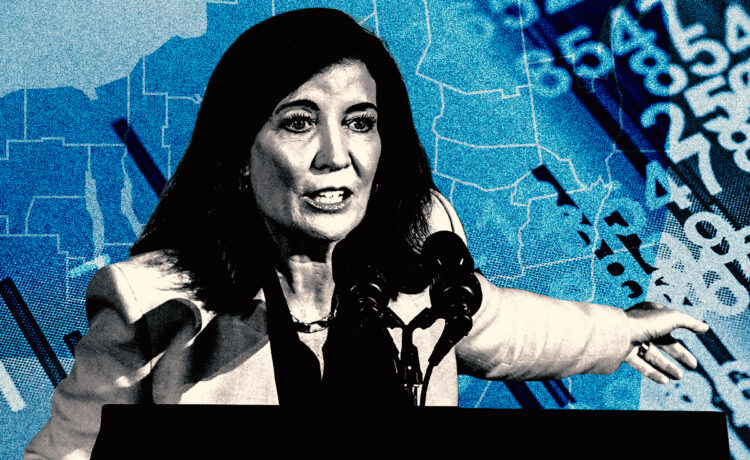One day into the second Trump administration, Gov. Kathy Hochul unveiled a $252 billion budget that calls for an extension of the state’s millionaire’s tax and new housing funds.
In her executive budget, Hochul is calling for a five-year extension of tax rates for the state’s highest earners. The rates — the highest of which, 10.9 percent, which applies to those earning more than $25 million a year — were slated to expire in 2027.
Attempts to raise these rates have previously been met with concerns that doing so would drive high-net worth earners out of the state, hurting the city’s luxury residential market and resulting in lost tax revenue. Hochul’s proposal doesn’t increase these rates, but prolongs them.
The continuation of these rates is aimed at helping to offset a number of proposals, including $1 billion in cuts for joint tax filers making less than $323,200, expanding the state’s child tax credit program and an extension of the state’s pass-through entity tax program, which was created to provide some relief from the federal government’s cap on how much state and local taxes filers can deduct from their federally taxable income.
The $10,000 SALT cap is expected to be changed as Congress negotiates various elements of the 2017 tax law that expire at the end of this year. Hochul said she is taking a “full repeal or no deal” stance on federal talks over SALT.
The Real Estate Board of New York president Jim Whelan said the budget makes “several common sense investments,” but questioned the governor’s extension of the tax rates for the state’s highest earners.
“At time when local leaders are appropriately calling on Washington for more relief from state and local taxes, it is probably not good policy or good optics to be seeking to maintain one of the highest state and local tax burdens nationally in New York, “ he said in a statement.
The Citizens Budget Commission criticized the budget as “short-sighted,” saying the budget “balloons” spending by 10 percent over the next year, weakening the “ability to meet New Yorkers’ needs during a future recession or in the face of potential federal cuts.”
“The budget’s proposed extension of the 2021 “temporary” personal income tax surcharge virtually guarantees that New York will be the tax and spending leader for much of the next decade,” Andrew Rein, CBC president, said in a statement.
When asked by a reporter about how she plans to address possible cuts in federal funding to the state, Hochul said that states “are not going to be able to backstop the loss of federal dollars.”
“If they put forward a budget that hurts New Yorkers, they better be the ones to fix it,” she said.
The governor’s budget calls for extending the state’s $700 million film production tax credit for another two years, through 2036. A state-funded report in 2023 found that the tax credit program does not provide a positive return on investment for taxpayers, in terms of direct tax revenue. Hochul’s budget additionally pitches making another credit available to independent film production companies.
As they competed for television shows and films to shoot within their states, lawmakers have increased such benefits over the years. In October, California Gov. Gavin Newsom proposed more than doubling his state’s annual tax credit program to $750 million.
As previously announced, Hochul’s executive budget includes legislation restricting institutional investor’s ability to buy single- and two-family homes, and that bans “collusion through the use of rent price-fixing software to protect.”
In December, the state pledged $1 billion over the next five years to help the city build 80,000 new homes over the next 15 years, as a result of the City of Yes for Housing Opportunity.
The governor also wants to allocate $50 million to the creation of a revolving loan fund for mixed-income rental housing outside of New York City. The proposal is similar to a bill proposed by Sen. Rachel May, though her legislation calls for a much higher initial infusion of $1.5 billion, and does not limit the location of projects based on geography but sets affordability requirements.
The executive budget calls for a $100 million fund to help pro-housing communities pay for infrastructure upgrades, and $25 million for supportive housing.
The governor’s executive budget is a starting point for negotiations with the state legislator. These talks will play out, and each chamber’s priorities will take shape, in the months ahead.
Read more

Hochul pitches housing fund but doesn’t require more construction

The Daily Dirt: Hochul’s housing agenda pitches modest changes

What we’re watching in critical real estate measures in Albany this year















